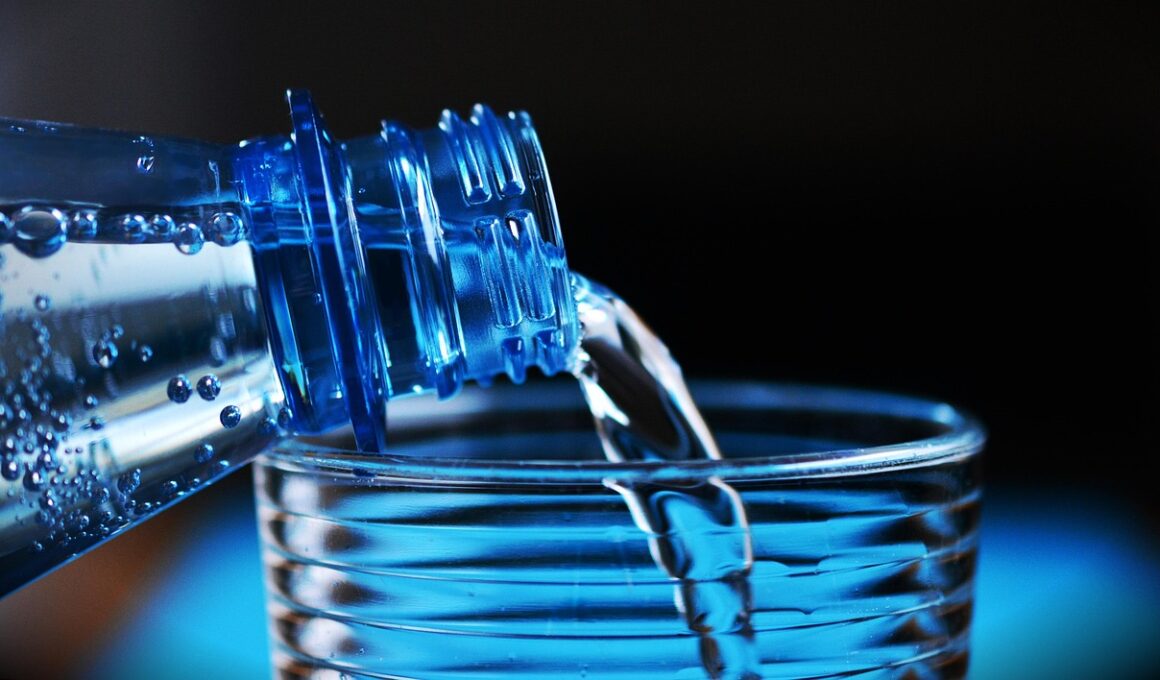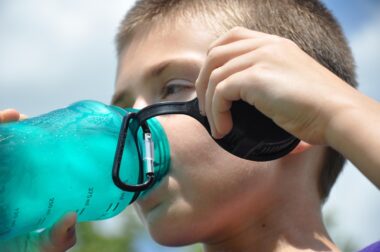Mindful Hydration for Weight Management and Fitness Success
Staying hydrated is essential for maintaining optimal health, especially when focusing on weight management and fitness. Mindful hydration involves being conscious of the types and amounts of fluids consumed throughout the day. Many overlook hydration’s vital role in achieving fitness goals. Water aids in digestion, nutrient absorption and helps in regulating body temperature. It’s crucial to drink adequate amounts of water before, during, and after exercising to replenish fluids lost through sweat. With mindful hydration practices, you can enhance your workout performance and support weight management effectively. Listening to your body’s signals for thirst can guide you in maintaining proper hydration levels. Focusing on whole, natural beverages positively impacts your energy levels and performance, while sugary drinks may contribute to unnecessary calorie intake. To better manage your hydration, consider using a water tracking app or a dedicated water bottle with measurements. Aim for a variety of hydration sources such as herbal teas or infused waters, making the process enjoyable yet functional. By prioritizing hydration, you empower your body to work efficiently, aiding your path toward effective fitness and weight management.
The Importance of Water Timing
Understanding the timing of hydration is critical for those pursuing fitness and weight management. Consuming water at strategic intervals throughout your day will maximize your hydration benefits. Drinking water before meals can help regulate appetite, potentially preventing overeating. During workouts, hydrating correctly replenishes lost electrolytes and supports endurance. It is essential to sip water every 15-20 minutes during exercise to help maintain peak performance and minimize fatigue. Post-workout hydration is equally vital, as it aids in recovery. Consuming fluids within 30 minutes after exercising can enhance muscle repair. Additionally, the temperature of the fluids can play a role; studies suggest that cold drinks might be more refreshing and promote better hydration during intense workouts. Keep in mind that personal hydration needs vary based on climate, duration of exercise, and individual metabolism. Therefore, being mindful about hydration during specific times can lead to improved fitness outcomes. Also, tracking your fluid intake can offer insights on your hydration habits. This awareness leads to more effective hydration strategies tailored to your routine, enhancing overall performance and encouraging weight management.
While water is essential, incorporating other mindful hydration practices can further elevate your fitness journey. Herbal teas, flavored water, and electrolyte-rich beverages can provide variety and additional benefits. For instance, green tea not only hydrates but also contains antioxidants that can support overall health. Additionally, smoothies can also serve as a dual-functioning drink that hydrates and nourishes the body post-exercise. Infused waters, made by adding fruits and herbs, can make drinking water more enjoyable and appealing, encouraging higher fluid intake. Be cautious, however, about overly sweetened or flavored drinks, as they may add unnecessary calories. Using a hydration tracker can help ensure you meet daily water goals, especially during hectic days. If you tend to forget to drink water, setting reminders on your phone can help create a routine. Over time, you’ll develop a habit of mindful drinking which not only improves your fitness but supports weight management. Experimenting with different hydration methods enables you to discover what works best for your preferences. Engaging in mindful hydration practices reinforces an essential component of a successful fitness journey.
Listening to Your Body
Part of mastering mindful hydration is listening to your body’s signals. Our bodies often communicate thirst, but in many cases, people mistake it for hunger. This misinterpretation can lead to excess calorie consumption when a simple glass of water would suffice. To enhance your mindfulness regarding hydration, pay attention to how your body feels. If you’re feeling fatigued or sluggish, ask yourself if you’ve had enough fluids throughout the day. Adjusting your hydration based on activity levels is important. On days with intense exercise or hot weather, increase your water intake accordingly. Observe how adequate hydration affects your energy and performance. Keeping a hydration log noting how much and when you drink can provide insight into patterns that impact your fitness goals. Transitioning towards more mindful hydration habits requires practice and commitment. Acknowledging that hydration is as important as nutrition can streamline your approach to overall wellness. Forming habits around water intake will ensure it becomes a priority in your daily routine, aiding in weight management and supporting physical activity. This awareness can lead to improved athletic performance and enhanced well-being.
Incorporating mindfulness into hydration can also involve assessing the quality of the water you consume. Filtered water is often preferred for its purity and removal of contaminants, making it a healthier option compared to tap water that may contain impurities. As you prioritize hydration, evaluate how quality affects your overall hydration experience. Taste and quality can encourage you to drink more water throughout the day, providing the health benefits needed for weight management. Use hydration devices or specialty water bottles that filter water as you drink; they provide convenience and assurance of clean drinking water. Some individuals might benefit from adding natural flavorings, such as lemon juice or cucumber slices, to enhance both health benefits and overall enjoyment. Experimenting with different flavors can keep your hydration routine interesting and increase fluid consumption. Furthermore, ensure consistent hydration practices by keeping water accessible. Having water bottles ready in your environment fosters an ongoing habit of mindful hydration. Putting your focus on both quality and accessibility promotes better hydration choices, supporting both fitness success and weight management initiatives.
Mindful Hydration Tools
Utilizing tools to enhance your mindful hydration journey can yield significant benefits. Several apps and gadgets are available that aid in tracking your hydration goals. These tools remind you to drink water throughout the day and help you gauge your fluid intake against your activity levels. Some applications enable users to set customized hydration goals based on weight, activity level, and climate conditions. Explore smart water bottles that track intake through connected technology. They offer reminders and motivating insights into hydration habits. For those looking for motivation, challenges related to hydration can also spark interest. Create a fun challenge with family or friends where everyone sets individual hydration goals. This approach can develop a supportive network and foster accountability in your journey. Ultimately, finding the right tools will help establish mindfulness in hydration practices. Stay flexible, adapting to changes in daily activity or lifestyle, and continue to refine your hydration strategies. The overall goal is to ensure consistent hydration habits, which will benefit your fitness outcomes and support the intrinsic nature of weight management success.
Ultimately, consolidating mindful hydration practices enhances both weight management and overall fitness success. By being intentional about fluid intake, timing, quality, and using supportive tools, individuals realize the importance of hydration in their daily routines. Make water a priority for both physical and mental well-being. Emphasize hydration as a foundational component of maintaining energy levels and an essential part of recovery after workouts. A regular practice of hydration mindfulness builds awareness around personal habits, making necessary adjustments more manageable as they arise. As you cultivate this practice, consider how your hydration choices impact your athletic performance and progression toward your weight management goals. Through consistent reflection and outreach, you can identify best practices around hydration that resonate with your lifestyle. Create a shared understanding of mindfulness regarding hydration within fitness communities you’re part of. Encourage discussions about personal hydration experiences and strategies, fostering a collective approach to mindful drinking. Adopting mindful hydration practices can lead to productive outcomes in fitness success and greater awareness concerning health and well-being. Working towards optimal hydration establishes a sustainable foundation on the path to achieving individual fitness objectives and weight management aspirations.





